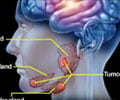Researchers at the University of Texas MD Anderson Cancer Center have identified that PKM2 protein has important non-metabolic functions in cancer formation.

The researchers demonstrated that PKM2 is essential for epidermal growth factor receptor (EGFR)–promoted beta-catenin activation, which leads to gene expression, cell growth and tumor formation.
They also discovered that levels of beta-catenin phosphorylation and PKM2 in the cell nucleus are correlated with brain tumor malignancy and prognosis and might serve as biomarkers for customized treatment with Src inhibitors.
In response to epidermal growth factor (EGF), the team found, PKM2 moves into the cell nucleus and binds to beta-catenin that has had a phosphate atom and three oxygen atoms attached at a specific spot called Y333 by the protein c-Src. This binding is essential for beta-catenin activation and expression of downstream gene cyclin D1. This newly discovered way to regulate beta-catenin is independent of the Wnt signaling pathway previously known to activate beta-catenin.
One enzyme controls both cancer cell metabolism and cell cycle progressionIn metabolism, PKM2 enhances oxygen-driven processing of sugar known as aerobic glycolysis or the Warburg effect found in tumor cells.
"Cancer cell metabolism and cancer cell cycle progression, which are essential for tumor formation, are conventionally thought to be regulated primarily by distinct signaling complexes," Lu said. The new findings integrate the two major mechanisms for regulating cancer cell growth by a key metabolic enzyme. "These two important regulatory processes are under the control of pyruvate kinase M2."
Advertisement
The researchers analyzed brain tumors in 84 patients who had been treated with radiation and chemotherapy after surgery. Those who had low beta-catenin Y333 phosphorylation or low expression of PKM2 in the nucleus (28 cases each) had a median survival of 185 weeks and 130 weeks, respectively.
Findings include:
- PKM2-dependent beta-catenin activation is instrumental in EGFR-promoted tumor cell proliferation and brain tumor development.
- c-Src activity, beta-catenin Y333 phosphorylation, and PKM2 nuclear accumulation are positively correlated in human glioblastoma specimens.
- Levels of beta-catenin phosphorylation and nuclear PKM2 are correlated with grades of glioma malignancy and prognosis.
Personalized therapy with Src inhibitorsOne potential implication of their research is the potential use of c-Src-dependent beta-catenin Y333 phosphorylation levels as a biomarker for selecting patients for treatment.
"This finding is very important because EGFR-based therapy is not very efficient due to drug resistance, and cancer patients need alternative treatment strategies," Lu said. "Thus, this discovery can potentially serve as a guideline for personalized cancer therapy in the treatment of glioma and other tumors with Src inhibitors."
Src inhibitors include dasatinib, which has been approved by the FDA for leukemia treatment, or bosutinib and saracatinib, which are in clinical trials.
Source-Eurekalert













